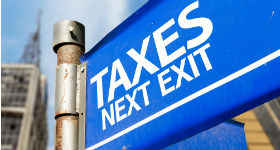In a bold and controversial move, the city of Chicago instituted a new cloud tax today that will target online databases as well as popular streaming media services like Netflix and Spotify. The tax is designed to recoup some of the sales tax that has gone missing as consumers shift their spending away from brick-and-mortar stores to digital services. But the way the tax is being instituted raises a number of questions and has gotten the legal community up in arms.
 Image via Shutterstock
Image via Shutterstock
The new tax is based on two recent rulings from the Chicago Department of Finance. The first involves “electronically delivered amusements” while the second relates to “nonpossessory computer leases.” Both rulings extend existing tax legislation to tack an extra nine percent tax onto certain types of online services.
Streaming media certainly seems to fall under the amusement umbrella, while the second ruling could conceivably cover anything from AWS to Lexis Nexus. According to law firm Reed Smith, the new laws cover streaming media services along with SaaS and PaaS, which amounts to an extremely broad range of vendors and solutions. Consumers using these services in Chicago will now be responsible for paying the tax, and companies like Netflix are already taking steps to incorporate it in their billing processes.
"Jurisdictions around the world, including the U.S., are trying to figure out ways to tax online services," said a Netflix representative. "This is one approach."
Michael Wynne, a partner at Reed Smith, claims the second ruling violates the 1998 Internet Tax Freedom Act, which is meant to prevent discrimination against services delivered via the Internet. And the firm believes both rulings violate the Federal Telecommunications Act as well.
"There's no question that the city needs revenue and I can see where things are escaping the old tax base," said Wynne, "I think the objectionable part is that, instead of drafting new laws for that, we're simply stretching the old laws to fit."
Cities like Chicago are struggling to recoup lost local taxes once derived from video rental and music stores. Consequently, it is very likely other municipalities will institute similar cloud taxes, to the chagrin of consumers and online service providers alike.
The new laws also raise questions about exactly how the tax will be instituted and how companies can possibly comply as mobile subscribers move in and out of the taxable jurisdiction. While the tax officially went into effect today, companies have until September 1 to implement it.
Edited by
Maurice Nagle